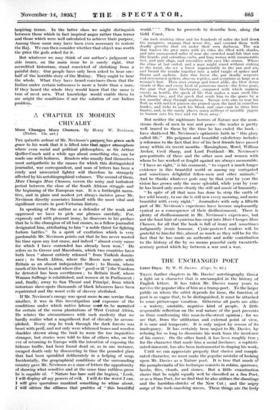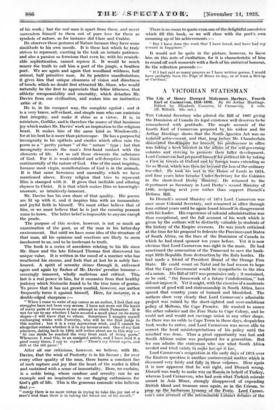THE UNCHANGED POET
Later Days. By W. H. Davies. (Cape. 7s. Od.) THESE further chapters in Mr. Davies' autobiography throw a light on a character that is unexampled in the history of English letters. It has taken Mr. Davies many years to survive the popular idea of him as a tramp-poet. To the larger public on whom the artist depends for fame, the' function- of poet is so vague that,, to be distinguished, it must be attached to some picturesque vocation. Otherwise all poets are alike —a watery, unstable, negative kind of people. A little responsible reflection on the real nature of the poet prevents us from condemning this man-in-the-street opinion ; for we see that, from the utilitarian and external point of view, it is sane and temperate. It is only unjust by reason of its inadequacy. It has certainly been unjust to Mr. Davies, by refusing for so long to dissociate his work from the incidence of his career. On the other hand, it has been roughly true ; for the character that made him a social freelance, a sophisti- cated-innocent, has also been instrumental in shaping his work.
• Until we can appreciate properly that elusive and compli- cated character, we must make the popular mistake of looking upon Mr. Davies as a Nature poet. It is true that much of the paraphernalia of his technique consists in robins, sparrows, lambs, flies, clouds, and stones.- But a little examination shows that he might equally well be classified as a Sea Peet, or as a Slum Poet,for we find that he also utilizes the shoutin,gs and the harridan-shrieks of the New Cut ; and the ankrk surge of the rock-smashing waves. These things are the body
Of his work ; but the real man is apart from them, and neyer surrenders himself to them out of pure love for them as symbols of nature, as for instance did Clare and Crabbe.
He observes these gestures of Nature because they have some similitude to his own moods. It is these last which he truly strives to represent, exerting in the task an infinite patience. and also a passion so ferocious that even he,- with his remark- able sophistication, cannot repress it. It would be flinch nearer the truth to call him a poet of the jungle, a heathen
poet.. We see again and again that woodland wildness, hale animal, half primitive man. In its' positiVe 'manifestations.
it gives him that unique cleanness of vision and directness of touch, which no doubt first attracted Mr. Shaw, who would naturally be the first to appreciate that feline litheness, that athletic irresponsibility and amorality, which detaches Mr. Davies from our civilization, and makes him an instinctive critic of it.
He is, in his compact way, the complete egotist ; and it is a very brave,-self-reliant, and simple man who can maintain
that integrity, and make it shine as a virtue. It is, in miniature, Godlike, and is therefore the source of that luminous joy which makes Mr. Havies work an inspiration to the religious heart. It makes him of the same kind as Wordsworth ; for at his best he is more than picturesque. He has a purposeful incongruity in his epithets and similes which often ruin the poem as a "pretty picture" of the " nature " type ; but that incongruity reveals the man's firsthand contact with the elements of life. Let us call those elements the substance of God. For it is weak-minded and self-deceptive to think sentimentally of the nature of God. One of the most inspiring, because most virgin, manifestations of Cod is in the animals. It is that same fierceness and amorality which we have mentioned above. Every religion that tries to represent Him is stamped with it. It gives that ineffable and alluring shyness to Christ. It is that which makes Him so knowingly- unaware, so intuitively-innocent.
Mr. Davies has his own share of that quality. His poems are lit up with it, and it inspires him with an immaculate and joyful faith in himself. We must either believe that of him, or we must believe that he is just the cunning peasant come to town. The latter belief is impossible to anyone except the prude.
The purpose of this review, however, is not so much an examination of the poet, as of the Man in his latter-day environment. But WWI we have some idea of the structure of that man, all his opinions and reactions are likely to seem incoherent to us, and to be irrelevant to truth.
The book is a series of anecdotes relating to his life since Mr. Shaw and the late Edward Thomas first -diseovered his unique value. It is written in the mood of a mariner who has
weathered his storms, and feels that at last he is safely har- boured. A spirit of serenity shines through it, enlivened again and again by flashes of Mr. Davies' peculiar humour—.
seemingly innocent, wholly malicious and critical. This last is a real power in him, for it emanates from that healthy jealousy which Nietzsche fonnd to be the true tonic of genius. To Prove that it has not grovn't morbid, hOwever, our author frequently turns it against himself. Here, for instance, is a :
double-edged sharpness :7-• "When I come to write of my career as an author, I that my struggles have not been very severe. I have not worn out the knees of many pairs of trousers in my attempt to climb Parnassus. It is not for me to say whether I have secured a small place on its many slopee—I will leave that to others. Sometimes I imagine myself exchanging winks with Posterity, who will be the final judge in this matter • but it is a very mysterious wink, and7-1 cannot be altogether certain whether it is in my favour or not One of-my first admirers, dating back to 1906, still writes about me in this way :— 'At one stride he reached the very front rank of living poets.' Whenever I read this, in an unsigned article, and I have read it a good 'many times, I say to myself= There's my friend again, and still at the old game.'"
After all our criticisms, however, we believe, with Mr. Davies, that the wink of Posterity is in his favour ; for over
every, other quality of the man, there burns a constant fire of such rapture and joy that the heart of the reader is filled
and sustained with a sense of immortality. Here, we exclaim, is a noble being, whose candour and serenity can be an example and an inspiration to our flagging enthusiasm for God's gift of life. This is the generous comrade who believes that ;—
"surely there is no more virtne in trying to take the- joy out of a man's soul than there is in taking the bread out of his mouth." There is no room to quote even one of the delightful anecdotes which fill this book, so we will close with the poet's own summing up of his achievements :— "But I have done the work that I have loved, and have had my reward in happiness."
It would not be quite in the picture, however, to liave him On this note of exultation, for it is characteristic of him
to round off such moments with a flash of his statistical humour. So the reflection proceeds :—
" If I had said as many prayers as I have written poems, I would have probably been the .Pope of Rome to day, or at least a Bishop or Cardinal.'



























































 Previous page
Previous page